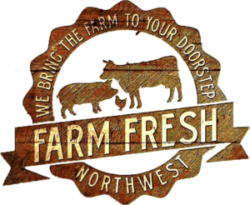In the picturesque landscapes of Washington State, the journey of grass-fed beef begins with a commitment to sustainability, animal welfare, and the natural beauty of the land. With a focus on pasture-based farming practices, ranchers in Washington State raise and care for their cattle in a manner that promotes the health of both the animals and the environment. Let’s delve into the process of how grass-fed beef in Washington State is raised and cared for, from the rolling pastures to the annual roundup using horses to brand and move cattle to summer pasture.
- Pasture-Based Farming At the heart of grass-fed beef in Washington State is the concept of pasture-based farming. Unlike conventional feedlots, where cattle are confined to crowded pens and fed grain-based diets, grass-fed beef in Washington State is raised on open pastures where they have access to fresh air, sunshine, and a diverse range of grasses and forages. This natural diet not only enhances the flavor and nutritional profile of the meat but also promotes the health and well-being of the animals.
- Rotational Grazing To ensure the health of the pasture and the animals, ranchers in Washington State employ rotational grazing practices. This involves dividing the pasture into smaller paddocks and rotating the cattle between them on a regular basis. This allows the grass to recover and regrow between grazing sessions, preventing overgrazing and soil erosion while maximizing the nutritional value of the forage. With rotational grazing, grass-fed beef in Washington State thrives in harmony with the land.
- Supplemental Feeding While grass is the primary source of nutrition for grass-fed beef in Washington State, ranchers may provide supplemental feed during times of limited forage availability, such as winter months. However, this feed is typically sourced from local sources and free of antibiotics, hormones, and genetically modified organisms (GMOs), ensuring that the cattle maintain their natural diet and healthful characteristics.
- Animal Welfare The welfare of the cattle is a top priority for ranchers in Washington State. Cattle are raised in low-stress environments where they have ample space to roam and graze freely. Additionally, ranchers provide access to clean water, shelter, and veterinary care as needed to ensure the health and well-being of the animals. By prioritizing animal welfare, grass-fed beef in Washington State reflects a commitment to ethical and sustainable farming practices.
- Annual Roundup Each year, ranchers in Washington State gather their cattle for an annual roundup, a time-honored tradition that dates back generations. Using skilled horsemanship and well-trained cattle dogs, ranchers round up the cattle from the open pastures and bring them to a central location for branding, health checks, and to prepare them for the upcoming summer grazing season. This time-honored tradition not only ensures the health and safety of the cattle but also allows ranchers to maintain a connection to the land and their heritage.
- Branding and Identification During the annual roundup, ranchers in Washington State use traditional methods to brand their cattle for identification purposes. Branding involves applying a unique mark to the hide of each animal using a heated iron, ensuring that they can be easily identified as belonging to a specific ranch. This practice not only serves as a form of identification but also reflects the pride and ownership that ranchers have in their cattle and their land.
- Moving to Summer Pasture After branding and health checks are complete, the cattle are ready to be moved to their summer pasture. Using horses and cattle dogs, ranchers guide the cattle to their designated grazing areas, where they will spend the summer months grazing on lush, nutrient-rich grasses and forages. This rotational grazing system allows the pasture to rest and regenerate while ensuring that the cattle have access to fresh, high-quality forage throughout the grazing season.
In conclusion, the journey of grass-fed beef in Washington State is a testament to the commitment of ranchers to sustainability, animal welfare, and the natural beauty of the land. From the rolling pastures to the annual roundup using horses to brand and move cattle to summer pasture, every step of the process reflects a deep respect for the land, the animals, and the time-honored traditions of ranching. By choosing grass-fed beef from Washington State, consumers can enjoy delicious, nutritious meat that is produced with care and integrity, while supporting local ranchers and preserving the heritage of the American West.
